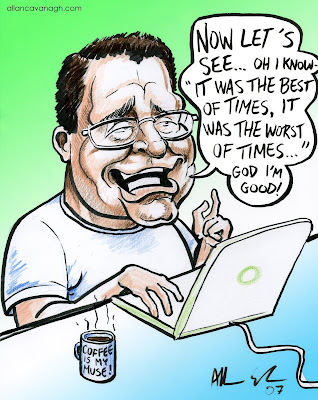
Soon after I first dated the Snapper, I was cringing in my car as she carefully, systematically and very crinkly-crunkly-noisily folded up her crisp packet, tucking in the final corner so that the empty plastic bag held its own triangulated shape.
Aware that I’d found it irritating, she turned to me and asserted calmly:
“It’s my thing. It’s what I do so get used to it.”
Since then I’ve grown immune to her triangulating compulsion, amazed only at the way size presents no object. Be it the tiniest sweet wrapper or a huge plastic Dunnes carrier bag, everything gets triangulated.
It’s what she does.
It’s who she is.
We all have our very own ‘things’. They are the foibles that define us, the quirks that can sometimes drive the uninitiated around the bend. They are the twitches and habits that you either fall in love with or move way from.
Essential to individuality, our eccentricities matter beyond apparently deeper differences. They are the driving force of our uniqueness.
Doubtless shocking to any who knows me, I confess to having one or two minor ones myself.
You don’t look at three quarters of a painting, nor just the top of a sculpture, so when watching a film I want to see the whole piece, intact, from beginning to end. No talking, no interruptions of any kind.
Admittedly, if it’s Vampire Zombies v Predator III, such rules might not apply, but out of respect to the masses who’ve worked on the movie, I’ll give it my full attention.
Last week I was watching ‘The Place Beyond The Pines.’ I was completely absorbed by fine storytelling, yet seemingly without conscious thought, my left hand picked up my smartphone.
Really?
Is this who I am now?
If so, who the hell is that?
Alone in my living room on a wet Saturday afternoon, the fire is blazing and Chelsea are live on the TV. I’m as happy as I might ever be.
If I made a 30 mile round trip to the city I could watch the game with friends, but although the camaraderie is fun, there’s also the chance that someone might sit next to me and blah blah blah in my ear all through the game, which drives me bananas.
So I convince myself the price of Sky Sports is cheaper than petrol and beer, so that I can sit in peace, able to focus on every aspect of the match.
Except - oh bloody hell! - I missed a Chelsea goal because I was reading about someone’s night out on Facebook.
After working days here in front of my computer, I eschew YouTube links people tell me to to watch, plumping instead for the mental stimulation of TV’s BBC 4, except Lucy Worsley has barely begun her explanation of the Reformation before I’ve picked up my smartphone to check Twitter and Facebook.
I don’t know who I am any more, while after years of resisting a smartphone, the Snapper now sits beside me, chucking gently to memes of doggy ears and messages from faraway friends.
Although we make sure to watch certain series together, and on occasion even talk to each other, we are now part of a vast tribe lost to their phones.
I used to sit outside Tigh Neachtain and look to the rooftops, enjoying the contrast between the grey slate, blue sky and green moss.
Now I’m head down double-chinned, trying to filter sunlight from my screen.
In the past I was contemptuous of those unable to appreciate being here and now, driven to record their time in Connemara through the filter of their phones.
Now I grab my phone on a walk, to photograph a spider’s web glistening in the early morning light.
Seeing it used to be enough.
Now I need to show it to the world.
Web designers and engineers Justin Rosenstein and Tristan Harris explained to Paul Lewis of The Guardian that they left their jobs at Google and Facebook to co-found an advocacy group called ‘Time Well Spent’, which implores tech companies to design less addictive software.
One of the team that created the all-powerful ‘Like’ button, Rosenstein noticed a few years ago that his ability to concentrate on the very things he wanted to focus on was being inhibited by technology.
“It was that kind of individual, existential realisation: what’s going on? Isn’t technology supposed to be doing the complete opposite of this? Everyone is distracted all of the time.”
Loren Brichter helped to design the swipe down/refresh software that pulls in punters on many social media. However she is not proud of her success.
“I have two kids and I regret every minute that I’m not paying attention because my smartphone has sucked me in.”
Our brains are being adapted by technology.
Each time you’re attracted to that red dot on Facebook’s icon, or just want to get rid of it, you’re responding to a reward-based behaviour that activates the brain’s dopamine pathways, the neurological routes designed to offer comfort, heat and all life’s good stuff, which also create gambling and drug addictions.
Now that 87% percent of people wake up and go to sleep with their smartphones, and people tap or swipe their smartphones on average 2,617 times a day (ouch!) it’s more important than ever to hang on to your differences.
Concentrate on being your fantastically wonderful self: alphabetical spice racks; picking your teeth with your toenails; hiding a hazelnut under a pillow; triangulated crisp packets and all.
Otherwise, in exchange for slavery to software, you’ll lose everything that makes you an individual.
©Charlie Adley
20.10.2017









